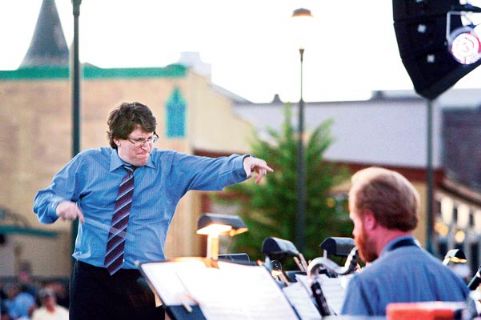|
Symphony
SRS SEASON ENDS WITH RESOUNDING TA-TA-TA-BANG
by Terry McNeill
Sunday, June 1, 2025
Symphony
YOUTHFUL VIRTUOSITY ON DISPLAY AT USO'S MAY CONCERTS
by Peter Lert
Saturday, May 17, 2025
Symphony
MYSTICAL PLANETS AND LIVELY GERSHWIN ORTIZ AT FINAL SRS CONCERT
by Peter Lert
Sunday, May 4, 2025
Symphony
VSO'S CONCERT MUSIC OF TIME, MUSIC OF PLACE
by Peter Lert
Sunday, April 27, 2025
Choral and Vocal
VOCAL ELEGANCE AND FIRE AT THE 222'S RECITAL APRIL 26
by Pamela Hicks Gailey
Saturday, April 26, 2025
CANTIAMO SONOMA SINGS AN INSPIRED GOOD FRIDAY MOZART REQUIEM CONCERT
by Pamela Hicks Gailey
Friday, April 18, 2025
DRAMATIC SHOSTAKOVICH SYMPHONY CLOSES PHILHARMONIC'S 25TH SEASON
by Terry McNeill
Sunday, April 13, 2025
LARGE COLLEGE OF MARIN AUDIENCE GREETS STOPHER ARTISTRY
by Terry McNeill
Saturday, April 5, 2025
Chamber
FRISSON DELIVERS SHIVERS OF DELIGHT
by Abby Wasserman
Sunday, March 30, 2025
OLD AND MOSTLY NEW IN SRS MARCH CONCERT IN WEILL
by Peter Lert
Saturday, March 22, 2025
|
 |
 Napa Valley Symphony Conductor Asher Raboy |
VIRTUOSIC EXCITEMENT AT NAPA VALLEY SYMPHONY CONCERT
by Terry McNeill
Sunday, January 31, 2010
Conductor Asher Raboy, in his final season with the Napa Valley Symphony, has established in a 20-year tenure a responsive orchestral sound and an interest in large and crowd-pleasing works. During a Jan. 31 concert in Yountville’s Lincoln Theater, Mr. Raboy had the opportunity to shine in two massive Russian pieces from two disparate composers.
Ukrainian-American pianist Valentina Lisitsa was the soloist in Tchaikovsky’s B-Flat Piano Concerto, Op. 23, and in the opening Allegro non troppo melded her artistry to a cordial accompaniment from Mr. Raboy and his players. The thunderous opening chords from the soloist were solid without banging, leading to an energetically-played first theme. But some problems popped up, not with wrong notes (though Ms. Lisitsa grabbed a few at the end of treble-register runs) but with balance and tempi. The instrument was initially too loud for the orchestra, and Ms. Lisitsa’s tempos tended to push ahead, clearly something different than Mr. Raboy had in mind. The cello and bass sound, perhaps due to the unorthodox seating the conductor preferred, seemed muted and the orchestra more muddy than distinct. The trumpets (Scott Macomber, Mark Nemoyten and Christy Dana) were excellent. The “question and answer” phrasing by Ms. Lisitsa in the cadenza was magical, holding the audience breathless.
Things jelled in the lovely Andante semplice, Diane Maltester’s clarinet solos sensitive and carrying to the back row of the 1,200-seat hall. Ms. Lisitsa’s trills were unvaryingly fast and even and her scales in the finale crystalline. The famous double octave passage in the concluding movement found the soloist plunging in with abandon, eschewing a slow beginning but achieving both speed and sonic clarity. The octaves had much of the Horowitz power and none of the Argerich confusion.
Not surprisingly the soloist had a tumultuous response from the audience of 850 with three curtain calls, and she responded with a wildly virtuosic Liszt Second Hungarian Rhapsody, the alternating tonic and dominant harmonies brought out with controlled flair. The right-hand skips were dead on, unfamiliar inner voices deftly displayed, and the last chord arpeggiated. It was a reading worthy of Gyorgi Cziffra, and praise can go no higher.
Following an extended intermission where Ms. Lisitsa met her adoring public in the lobby, the orchestra returned to the somber and thrilling Fifth Symphony of Shostakovich, Op. 47. Before the concert I overheard conversations questioning the ensembles’ ability to mount a cogent performance of the long and difficult work. But such fears were unwarranted, and Mr. Raboy led a performance long on architectural stability and pathos. As in the Tchaikovsky, he never seemed to be in any hurry, prefacing the performance with a pithy verbal description of the work’s origin in 1937. Presciently, he said to the audience that all the tragic political and social underpinnings of the Shostakovich Fifth were really just a footnote, and the real importance was the cosmos of human emotion inherent in the composition. Different than the neglected Fourth Symphony (Op. 36, 1934), the D Minor Fifth is a triumph over adversity. The unison strings set the tone in the first movement in what is essentially a grotesque march, similar to the often banal Shostakovich themes. But he is a great master, for me the finest 20th Century composer, and banal themes in his hands become evocative and potent. The oboe (Barbara Midney) and bassoon (David Granger) solos were exemplary and the fetching second theme in the violins was played serenely. The ending with celesta and unidentified harpist was soulful, no less so as the conductor took only the slightest ritard.
The Allegretto seemed untroubled and carefully paced, with fine violin playing by Concertmaster Yasushi Ogura and solo flutist Rebecca Pollock-Ayres. The highlight of the somber and spiritual Largo were the duets for harp and flute, with oboe and horn solos reminiscent of the Prelude to Act Three of Wagner’s “Tristan.” In this movement Shostakovich splits the cellos in different combinations with the bass, producing subtle counterpoint. The timpanist’s gong was overloud, covering the concluding tremolos in the strings. This slow movement was played with delicate beauty, Mr. Raboy wringing meaning from every note.
The concert concluded with the eruption of the final Allegro, encompassing much of the climax of the first movement in manner if not actual material. The shifts from D Minor to finally D Major were courageously and almost obsessively played, and the final fortissimo bass drum strokes from percussionist Susan Jette brought the audience to its feet, and a smile to Mr. Raboy. He clearly knew what his orchestra had brought to the hall, with nothing left on the table.
Contributing to this review was Daniel Greenhouse. The reviewer is producing a forthcoming concert for Ms. Lisitsa.
|

